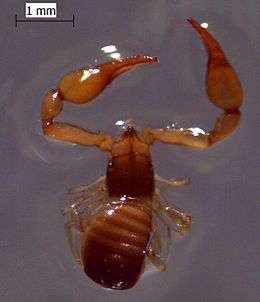Chthoniidae
Chthoniidae is a family of pseudoscorpions within the superfamily Chthonioidea. The family contains more than 600 species in about 30 genera. Three fossil species are known from Baltic and Dominican amber.[1]
| Chthoniidae | |
|---|---|
 | |
| Chthonius sp. | |
| Scientific classification | |
| Kingdom: | Animalia |
| Phylum: | Arthropoda |
| Subphylum: | Chelicerata |
| Class: | Arachnida |
| Order: | Pseudoscorpiones |
| Superfamily: | Chthonioidea |
| Family: | Chthoniidae Daday, 1888 |
| Genera | |
|
see text | |
| Diversity | |
| c. 30 genera, > 600 species | |
Genera
For a list of all currently described species see List of Chthoniidae species.
- Afrochthonius Beier, 1930 — Africa, Sri Lanka
- Allochthonius J. C. Chamberlin, 1929 — Japan, Korea
- Aphrastochthonius J. C. Chamberlin, 1962 — Mexico, southern US, Guatemala, Cuba
- Apochthonius J. C. Chamberlin, 1929 — North America
- Austrochthonius J. C. Chamberlin, 1929 — South America, Australia, New Zealand
- Caribchthonius Muchmore, 1976 — Caribbean
- Centrochthonius Beier, 1931 — Russia, China, Tibet, India, Nepal
- Chiliochthonius Vitali-di Castri, 1975 — Chile
- Chthonius C. L. Koch, 1843 — Europe to Iran, North Africa, Balearic Islands, USA; one cosmopolitan species
- Congochthonius Beier, 1959 — Zaire
- Drepanochthonius Beier, 1964 — Chile
- Francochthonius Vitali-di Castri, 1975 — Chile
- Kleptochthonius J. C. Chamberlin, 1949 — USA
- Lagynochthonius Beier, 1951 — Australasia, Africa
- Malcolmochthonius Benedict, 1978 — USA
- Maorichthonius J. C. Chamberlin, 1925 — New Zealand
- Mexichthonius Muchmore, 1975 — Mexico, Texas
- Mundochthonius J. C. Chamberlin, 1929 — Eurasia, Dominican Republic, North America
- Neochthonius J. C. Chamberlin, 1929 — California, Romania (?)
- Paraliochthonius Beier, 1956 — Europe, Africa, Florida, several islands
- Pseudochthonius Balzan, 1892 — South, Central America, Africa
- Pseudotyrannochthonius Beier, 1930 — Australia, Japan, Korea, USA, Chile
- Sathrochthoniella Beier, 1967 — New Zealand
- Sathrochthonius J. C. Chamberlin, 1962 — Australia to New Caledonia, South America
- Selachochthonius J. C. Chamberlin, 1929 — southern Africa
- Spelyngochthonius Beier, 1955 — Sardinia, Spain, France
- Stygiochthonius Carabajal Marquez, Garcia Carrillo & Rodriguez Fernandez, 2001 — Spain
- Troglochthonius Beier, 1939 — Italy, Yugoslavia
- Tyrannochthoniella Beier, 1966 — New Zealand
- Tyrannochthonius J. C. Chamberlin, 1929 — Brazil to southern USA, Australasia, Africa, Hawaii
- Vulcanochthonius Muchmore, 2000 — Hawai'i
- †Weygoldtiella Harvey et al., 2018 — Myanmar
Footnotes
- Biology Catalog
gollark: I'm sure that I at least fell over sometimes as a child.
gollark: I mean, it'd be hard to have *never* hit my head on something.
gollark: Probably!
gollark: PotatOS Tetrahedron has folders in it, but it's not really in wide use yet.
gollark: What's a "folder" and how is it outdated?
This article is issued from Wikipedia. The text is licensed under Creative Commons - Attribution - Sharealike. Additional terms may apply for the media files.